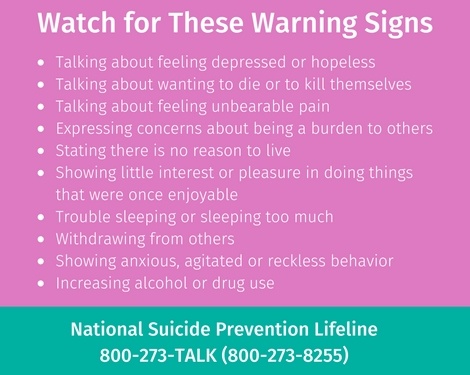Sometimes we avoid the most important conversations we should have with older adults. We think our deliberate silence may prevent hurt feelings, angry outbursts or uncomfortable, awkward moments. However, keeping quiet may pose serious risks to their health and safety. 
Here are just a few examples of ways we don’t communicate with one another:
- A recent survey by Care.com found 54 percent of adult children would rather talk to their teens about sex than talk to their aging parents about driving concerns.
- According to the Alzheimer’s Association, only 45 percent of people with Alzheimer’s disease or their family caregivers report being told about their diagnosis.
- The Centers for Disease Control and Prevention notes that even though one out of four older adults falls each year, less than half tell their doctor about those falls.
Another topic that may be difficult to talk about is suicide by older adults. While men (of all ages) are at higher risk for suicide than women, the suicide rate among men ages 75+ is higher than any other age group.
Older adults are more likely to die from suicide attempts than younger adults. Some reasons for this are frail health due to underlying health conditions, determination to die and isolated living conditions that make rescue less likely. Suicide risk factors for older adults include depression, isolation from friends and family, medical conditions that limit function, chronic or unbearable pain and recent losses.
You may have reason to be concerned if your loved one is feeling low but truly not know what to do next. You can alert the primary care physician, and there may be medications, mental health services or other community support available. Experts say if you think someone is at risk for hurting themselves or others, contact emergency services right away.*

Another resource for lonely or depressed seniors is the Friendship Line (800-971-0016), the nation’s only 24-hour accredited crisis intervention line serving older adults (ages 60+) and younger disabled adults. The Friendship Line, a service of the Institute on Aging (IOA), was started in 1973 by Dr. Patrick Arbore, director of the IOA’s Center for Elderly Suicide Prevention. Since older adults typically don’t call a suicide prevention hotline, the goal was to create something warm and inviting for them. In addition to immediate suicide intervention, the Friendship Line offers ongoing outreach and support, logging 80,000 to 100,000 calls annually.
“The underlying premise is if people call while feeling isolated or low, it might help them not turn to suicide,” said Anne Bartoletti, Friendship Line supervisor. “The most important part of what we do is listen. We provide emotional support.”
Key reasons people call the Friendship Line include loneliness, isolation, depression and pain. Callers are often experiencing chronic physical pain and/or emotional pain and want to talk with someone about what they’re going through. They want someone to understand their frustration with their ailments and physical limitations and their grief and loneliness from the loss of family members and friends.
“The Friendship Line is very inviting for a lot of our callers, even for those who have a circle of friends and family who support them. Sometimes their friends and families don’t want to hear about the issues our callers want to talk about. They can call us. We are here to listen,” said Bartoletti. She added just talking to someone helps relieve their loneliness, anxiety and feelings of isolation.
The Friendship Line is staffed by a team of approximately 100 volunteers (including retired psychologists, college students, other professionals and community members) who provide listening ears in scheduled shifts throughout the day and night. The volunteers, who all receive extensive training in client-centered care, suicide assessment and intervention, are motivated by a strong desire to help others. Supervisors on staff also take calls, do administrative tasks and support the volunteers.
When asked to describe the joys and challenges of the Friendship Line, Bartoletti said, “The hard part is realizing how much pain is out there. The wonderful part is when many people, who are hurting and in pain, thank you for being there. You know you made a difference.”
The Friendship Line offers a connection to seniors and disabled adults, using an approach of safety and support. Sometimes a simple conversation can be a life line.
*Older adults who have thoughts about killing themselves with a plan and intent to act should not be left alone but should be supervised for their safety until emergency services are in place.
(This action is recommended by The Substance Abuse and Mental Health Services Administration and Administration on Aging.)
Editor’s note: This article was originally published Aug. 17, 2016. It has been revamped and updated for accuracy and comprehensiveness.
![Duel-Logo-CFC-AYS[rgb]](https://blog.comforcare.com/hs-fs/hubfs/Duel-Logo-CFC-AYS%5Brgb%5D.jpg?width=525&name=Duel-Logo-CFC-AYS%5Brgb%5D.jpg)